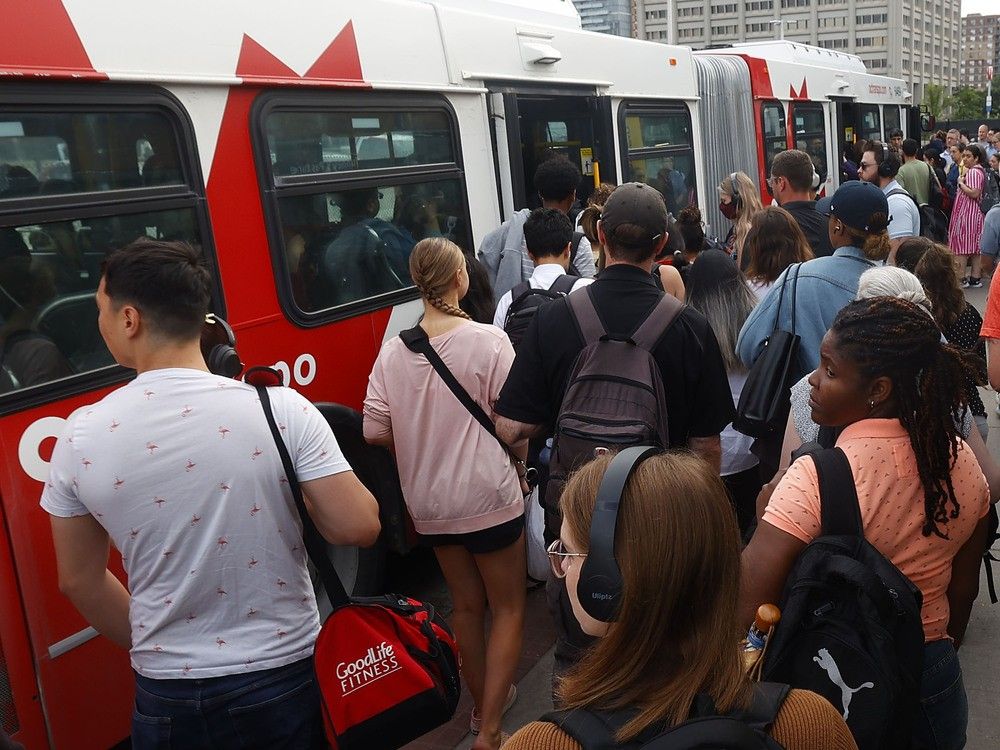Ottawa city councillors voiced their frustration with OC Transpo’s “stagnant” metrics as the transit authority continues to
fall short of its targets
for reliability and on-time delivery of its bus service.
At the Sept. 11 transit committee session — the first under acting general manager Troy Charter following
the departure of his predecessor, Renée Amilcar
— staff presented a report showing
little progress
in reaching the 99.5 per cent target for delivering its scheduled bus trips and the 85 per cent targets for regularity and punctuality.
Charter acknowledged OC Transpo “hasn’t seen the results yet” after launching a major route redesign in April with its “new ways to bus.” Charter told the committee he is still confident the service will meet its targets by the December 2027 goal.
OC Transpo staff said 98.4 per cent of its bus trips were delivered as planned over the 12 months ending in August. That’s 1.7 per cent short of the target and the exact same bus cancellation rate during the same span 12 months earlier.
OC Transpo managed to reach the 85 per cent target for on-time arrivals of its most frequent routes in July and August. The 12-month average of 81 per cent, however, is identical to the previous 12-month average and short of the 85 per cent reliability target.
The 12-month average of 72 per cent for punctuality of less frequent routes is, likewise, the same as the previous year and 13 per cent shy of its target.
Bus and O-Train ridership, meanwhile, increased by 4.1 percent over the same 12-month period a year earlier, with 69.3 million trips, according to OC Transpo data up to the end of July.
Charter said the 1.6 per cent cancellation rate was due to mechanical breakdowns, on-street service adjustments, including traffic delays and construction detours, the lack of available drivers or the lack of available buses.
River Coun. Riley Brockington had earlier introduced a motion directing staff to present its plan to fix its reliability issues.
Brockington said Charter’s predecessor, Amilcar, had told the committee that bus service would improve once OC Transpo hired new drivers, hired more mechanics, extended the O-Train in January and implemented its massive bus route redesign in April.
“I look at the stats every month and they’re stagnant (despite clearing) all these major hurdles,” Brockington said Thursday. “The metrics presented to us are flat. We’re not seeing progress in our on-time performance metrics… despite raising this month after month with now successive general managers.
“I would have loved for the report to acknowledge that we’re not making progress,” Brockington told Charter. “That would provide me some comfort as a transit commissioner that you acknowledge that we have a problem here.”
Brockington said concern over bus reliability is “the number-one issue I hear from my residents… It is non-stop every day since the day I was elected.”
OC Transpo is gradually replacing its aging fleet of buses, Charter told the committee, and working through a maintenance backlog while awaiting the delayed delivery of its new fleet of electric buses.
“Getting that reliable fleet, getting those new buses on board, reducing the age of fleet, reducing the maintenance requirements (are) moving forward,” Charter said Thursday.
OC Transpo is continuing its focus on recruitment, though “the main challenges now is about maintaining and sustaining” its stable of operators and mechanics.
Charter said staff at OC Transpo’s call centre have to make “tough decisions” on which bus routes to cancel, with the city’s more frequent routes often the ones seeing cancellations.
Route 7 had 158 of its 3,880 scheduled trips cancelled (with 94. 1 per cent of trips delivered); Route 12 had 163 of its 4,167 trips cancelled (93.8 per cent); and Route 6 had 217 of its 4,258 trips cancelled, with buses arriving for only 93 per cent of scheduled trips and a 7 per cent cancellation rate.
“We want to deliver every trip that we advertise. But staff are forced to make some tough decisions,” Charter said. “We try to avoid cancelling routes that are servicing schools, hospital routes, first and last trips, and very infrequent routes where customers don’t have much choice.
“So, unfortunately, some of those more frequent routes are the ones that get cancelled, so we minimize the impact as much as possible. But it’s not an ideal situation.”
Director for transit bus operations Rami El Feghali told the committee earlier this year that more than half of OC Transpo’s diesel fleet was above the 15-year “useful life” cycle.
Of its fleet of 735 conventional buses, OC Transpo’s 78 double-decker buses “will be the only high-capacity buses below retirement age,” he said.
Every articulated bus will be “officially due for retirement” by spring 2026, El Fegali said.
Kitchissippi Coun. Jeff Leiper said the situation is “urgent” with the return-to-office on the horizon.
“We’re not getting the riders back except to the extent they’re being forced by employers,” he said. “People are not being attracted to the transit system… The return-to-office that looks apparent to come is going to severely strain our transit system. We have to get on top of delivering great transit service sooner rather than later.”
Beacon Hill-Cyrville Coun. Tim Tierney said Charter was “taking a lot of flak for a decision that council made three years ago” to convert its fleet to e-buses, which are gradually being delivered to the city.
“There are no buses for people to drive,” Tierney said. “You can have as many drivers as you like, but there’s no bus to drive.”



